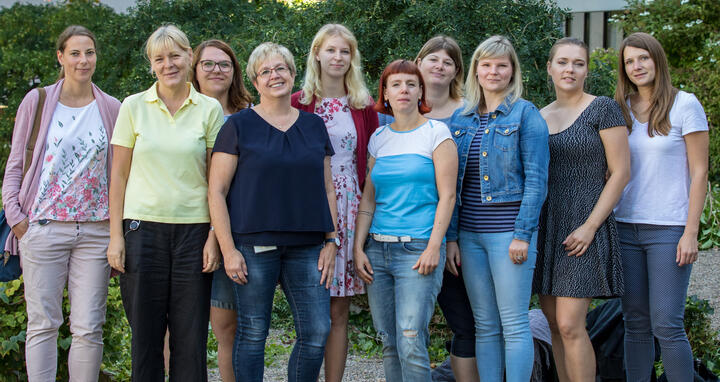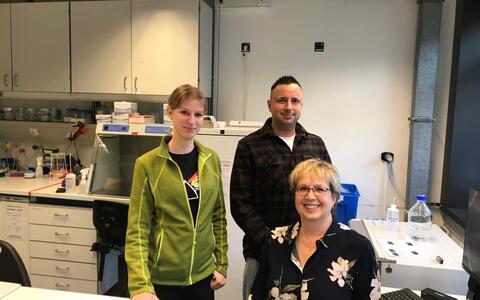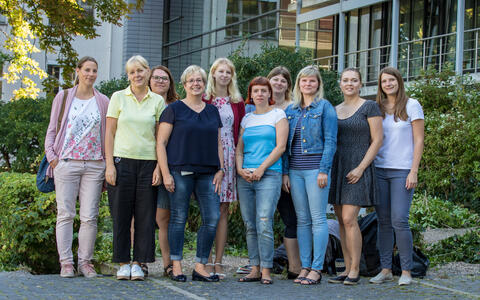“We were invisible”
In the staircase of Research Building 31.1 there is a small meeting room hidden on the first floor. It contains a table strewn with lots of papers, and the only spot of color is an hourglass filled with blue sand. Sitting around the table are Lisa Spatt, Markus Hensel and Jana Richter. The three are technical assistants – or TAs for short – at the MDC. They are active as TA Representatives in a group that they and other colleagues set up to advocate for their common interests.
f.l.t.r.: Lisa Spatt, Markus Hensel, Jana Richter
PhD students and postdocs have had their own representatives for a long time. Now the TAs do, too. What brought this about?
Markus Hensel: Several TAs took part in the Anti-Harassment Task Force, which began its work in late 2018. During this time, they realized that no one specifically represented the interests of technical assistants at the MDC while other groups such as PhD students have their own representatives. In parallel and independently of the task force, a survey was launched in collaboration with the Staff Development Department, the Staff Council and the Board of Directors to determine the level of satisfaction among the TAs and to investigate their opinions on continuing education.
Lisa Spatt: When the survey results came in in April 2019, we had the idea to create our own interest group. Several TAs signed up on that very day to participate. Now there are usually ten to twelve of us. Yet we are not elected by the TAs, but rather we came together out of shared interests to give TAs a voice and to support them as much as possible.
What does this support look like? What goals are you pursuing?
Markus Hensel: We want to increase exchange and communication among ourselves, for example, in cases where TAs positions are eliminated when the head of a research lab retires. We want to work with the Personnel Department to help our “freed-up” colleagues to find a new lab that as much as possible is a good fit for them, and we want to play a part in determining training opportunities.
Jana Richter: We want to strengthen the status of TAs at the MDC…
Lisa Spatt: …because we were invisible before. Even though there are so many of us. We had the feeling that no one was sufficiently advocating for our interests and concerns. We want to change that. We no longer want to simply accept decisions made by others, but want to be involved in decision-making processes. For example, one thing we want to achieve is that TAs can use normal modern computers at their workplace. Some labs have only one ten-year old computer, which several TAs and students have to share. In such cases you can’t even search for information on the intranet or fill out your timesheet without being disturbed.
What other needs do technical assistants at the MDC have?
Jana Richter: TAs are predominantly women, and many have children. It is hard for them to work from 8:30 to 5. Many would like to have more flexible work options such as part-time work and flextime.
Markus Hensel: Or more training opportunities. If you work part-time, it is very difficult to participate in training courses, which usually run the entire day. That was one of the first issues we tackled. We brought this situation to the attention of the Life Science Learning Lab, with which the MDC works closely. As a result, it now plans to offer, for the first time, half-day trainings for TAs.
The representatives want to strengthen the position of technical assistants at the MDC.
Ms. Richter, are you the spokesperson for the older generation of TAs? What issues are you working on?
Jana Richter: I believe that older TAs often have to deal with stereotypes: For example, they are not “motivated enough” to learn new techniques. Occasionally, language barriers make communication difficult.
It is important, not only to me but to all of us, that the MDC takes a strong stance against bullying and discrimination. There are now ombudspersons at the MDC that serve as first points of contact when something of this nature occurs.
Markus Hensel: More than a dozen MDC employees are now being trained as first points of contact; some of them can also complete a conflict management certification program.
Jana Richter: …and here the TAs are sadly at the back of the line. The certified training is a costly affair, so only three people were selected for it. There was unfortunately not a technical assistant among those selected – although as a group the TAs are especially affected and through their work on the task force pushed to create these points of contact and ombudspersons in the first place. We were very disappointed about this, although we are represented among the first points of contact and received a “light” version of the conflict management training.
What questions and problems do TAs come to you with?
Lisa Spatt: A big issue currently is the matching system: There are quite a few lab heads who are going to soon retire at around the same time. That means that an unusually large number of TAs will be freed up. Now we need to see how they will be placed in new roles, how they can prepare themselves or what training they need to do. The MDC Staff Development Department has developed a system, which is available on SharePoint, in which lab heads can use a “Competencies Sought Sheet” to specify what methodological experience they require from TAs. TAs can use a “Competencies Overview Sheet” to indicate what methodological experience they have. We frequently receive queries about this system.
Markus Hensel: We reviewed these sheets together with members of the TA network and suggested several improvements and additions, because they weren’t detailed enough in many regards to capture the skill sets of TAs. At the moment we are trying to make the matching process more transparent, so that one can see how the placement works in both directions.
Lisa Spatt: That’s what we’re here for – to politely and frequently inquire about things, to be a constant reminder.
What kind of feedback have you received from the TAs about your work?
Lisa Spatt: We officially introduced ourselves in October. We didn’t know what to expect beforehand. Our fear that no one would show up didn’t come true. We were positively surprised: The auditorium was full, and those at the MDC Berlin-Mitte (BIMSB) followed the meeting via a live video stream. There it became clear to us that our work is welcome and important. TAs had so far stayed in the background and were not used to calling attention to themselves. We now want to encourage them to demand a greater say, to make clear to them that their opinion is important. That can’t be accomplished with one meeting. If we remain active and present, we will certainly get there.
***
The interview took place before the MDC scaled down its operations and social distancing guidelines were put in place due to the coronavirus pandemic. In the meantime, nearly 40 TAs have signed up to support Charité – Universitätsmedizin Berlin and Labor Berlin, who are seconded from the MDC as needed. Many are also engaged in volunteer activities.
***
There are currently 190 technical assistants working at the MDC, and some 80 percent of them are employed on a permanent basis. A good ten people are now actively involved in the work of the TA Representatives.
Lisa Spatt trained as a biological laboratory technician before completing a Biological Technical Assistant (BTA) training program at the MDC. Since mid-2018, she has worked in the Kathrin de la Rosa’s lab, where she is responsible for lab organization, management and experiments while also pursuing her own projects. “I enjoy my work and I especially like that the research at the MDC is so diverse – it’s possible to explore a wide a variety of subjects and you learn a lot in the process.”
Markus Hensel has been working at the MDC for 14 years. He did his BTA training at Berlin’s Lise Meitner School of Science. What makes the MDC special to him is that research is carried out across many different scientific disciplines. “Here it’s possible for a TA to acquire a broad spectrum of knowledge and skills over the years.”
Jana Richter trained as a medical laboratory assistant at the Robert-Rössle-Institut, one of the research institutes of the GDR Academy of Sciences from which the MDC emerged. She worked for 20 years in cancer research and then many years in cardiovascular research. Since 2015, she has been responsible for lab management and zebrafish experiments in Jan Phillip Junker’s lab at MDC Berlin-Mitte (BIMSB). “It was sad to leave the Berlin-Buch campus after working there for 39 years. But I very much enjoy working in the young lab. My experience makes me a calming presence.”






